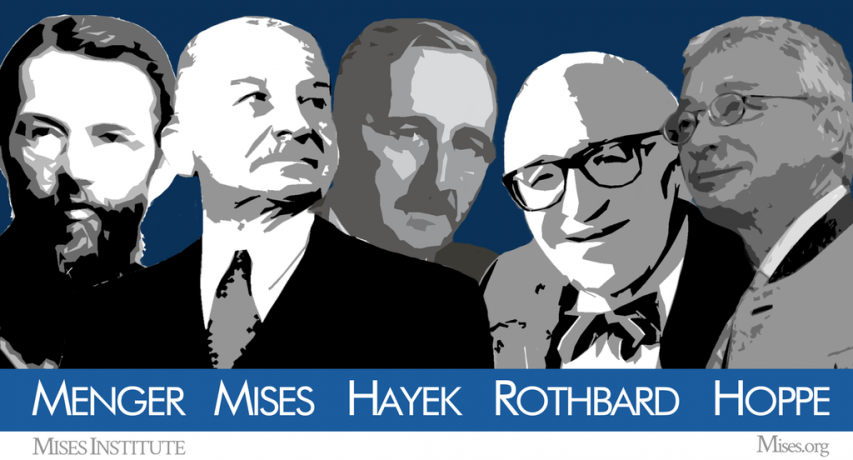Tim Worstall responds to a Guardian article on recessions (we’re apparently due for another one, according to the writer) and suggests that the Austrian theories may be helpful to understand what’s going on:

A Mises Institute graphic of some of the key economists in the Austrian tradition (Carl Menger, Ludwig von Mises, Friedrich Hayek, Murray Rothbard, and Hans-Hermann Hoppe.
Mises Institute via Wikimedia Commons.
As a pencil sketch – all you can do in a single article – that’s rather good. So, fine, let’s run with that. We’ve not had a normal recession for ages, one will come along soon enough and we’ve forgotten how to deal with it.
However, we can take this idea a little further too. Off into the wild spaces of Austrian theory. There a recession happens because of the built up malinvestment across the economy. Essentially, when it’s too easy to finance stuff then too much bad stuff gets financed. We need the regular recession to flick off the froth and get back to a more sensible allocation of capital.
My own view is that there is no one correct macroeconomic theory but that all of them contain elements of the truth. The trick is to work out which theory to apply to which happenstance. Reorganising the Soviet economy wasn’t going to be done by a bit of Keynesian demand management, there was a century of misallocation to chew through. Getting out of 2008 was different because it was the financial system that had fallen over, we didn’t just have that cyclical decline in business investment. Etc. Austrians can – perish the thought, eh? – be a little too fervent in the insistence that all recessions are about misallocation that must be purged.
But note the underlying thing we can pick up from Davies here. We’ve been staving off that normal recession for decades through that management. Perhaps it’s not all that good an idea to continually do that? He really does say that the Crash stemmed from those attempts to stave off after all. Thus, in a sense, we could argue that we’re going to get the recessionary horrors come what may. Even Keynesian demand management might not be the correct solution if it just gives us once in a generation collapses rather than more regular downturns?
That is, perhaps the Austrians are at least in part right? We need the regular purges for fear of something worse?







